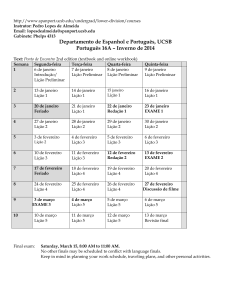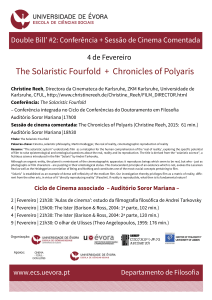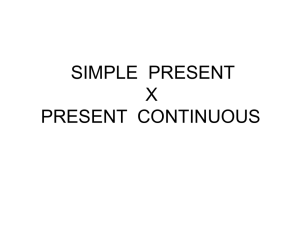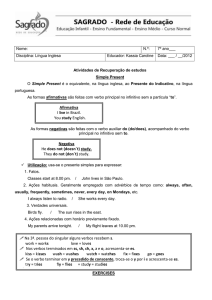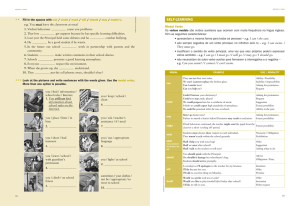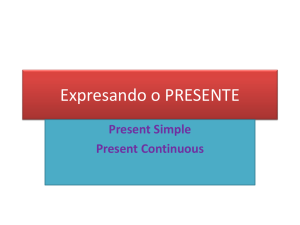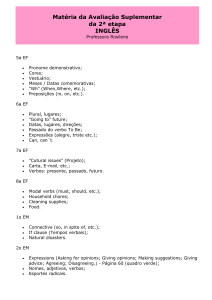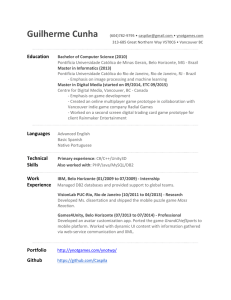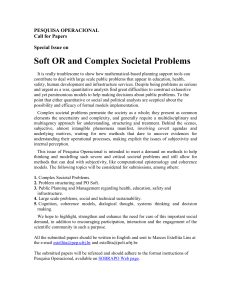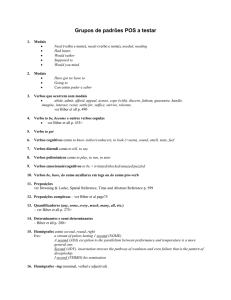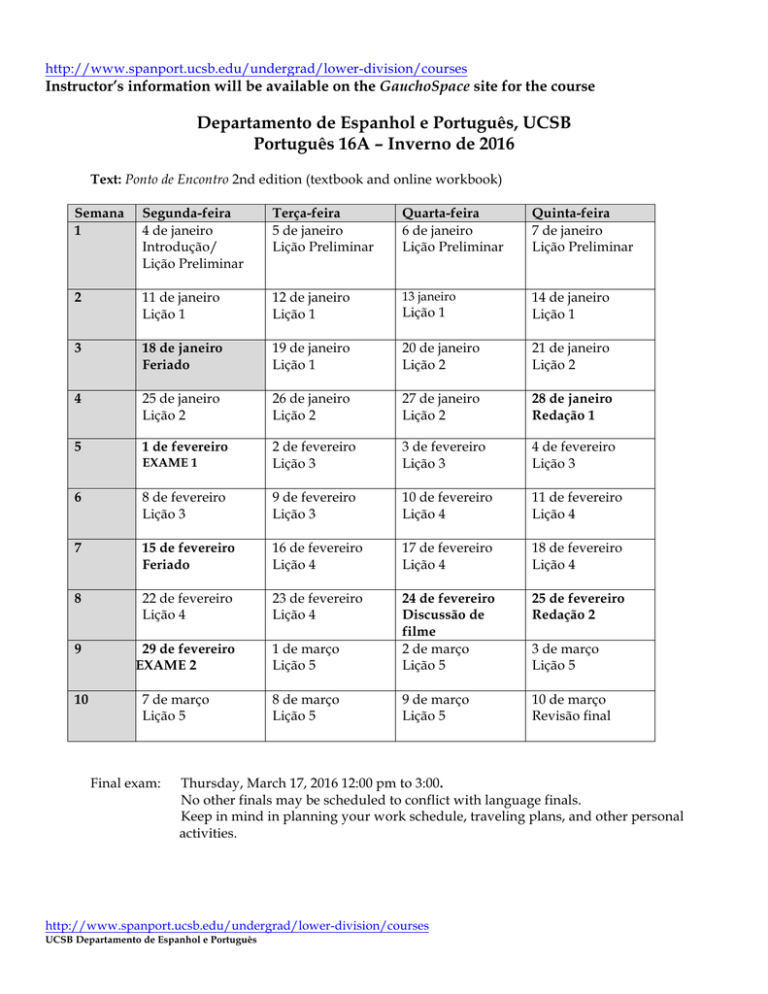
http://www.spanport.ucsb.edu/undergrad/lower-division/courses
Instructor’s information will be available on the GauchoSpace site for the course
Departamento de Espanhol e Português, UCSB
Português 16A – Inverno de 2016
Text: Ponto de Encontro 2nd edition (textbook and online workbook)
Semana
1
Segunda-feira
4 de janeiro
Introdução/
Lição Preliminar
Terça-feira
5 de janeiro
Lição Preliminar
Quarta-feira
6 de janeiro
Lição Preliminar
Quinta-feira
7 de janeiro
Lição Preliminar
2
11 de janeiro
Lição 1
12 de janeiro
Lição 1
13 janeiro
Lição 1
14 de janeiro
Lição 1
3
18 de janeiro
Feriado
19 de janeiro
Lição 1
20 de janeiro
Lição 2
21 de janeiro
Lição 2
4
25 de janeiro
Lição 2
26 de janeiro
Lição 2
27 de janeiro
Lição 2
28 de janeiro
Redação 1
5
1 de fevereiro
EXAME 1
2 de fevereiro
Lição 3
3 de fevereiro
Lição 3
4 de fevereiro
Lição 3
6
8 de fevereiro
Lição 3
9 de fevereiro
Lição 3
10 de fevereiro
Lição 4
11 de fevereiro
Lição 4
7
15 de fevereiro
Feriado
16 de fevereiro
Lição 4
17 de fevereiro
Lição 4
18 de fevereiro
Lição 4
8
22 de fevereiro
Lição 4
23 de fevereiro
Lição 4
25 de fevereiro
Redação 2
9
29 de fevereiro
EXAME 2
1 de março
Lição 5
24 de fevereiro
Discussão de
filme
2 de março
Lição 5
8 de março
Lição 5
9 de março
Lição 5
10 de março
Revisão final
10
7 de março
Lição 5
Final exam:
3 de março
Lição 5
Thursday, March 17, 2016 12:00 pm to 3:00.
No other finals may be scheduled to conflict with language finals.
Keep in mind in planning your work schedule, traveling plans, and other personal
activities.
http://www.spanport.ucsb.edu/undergrad/lower-division/courses
UCSB Departamento de Espanhol e Português
Português 16A, Inverno de 2015
Instructor’s information will be available on the GauchoSpace site for the course
DATA
Lição Pre.
4
5
6
7
Lição 1
11
12
13
14
18
19
Lição 2
20
21
PONTO DE ENCONTRO
Trabalho para casa (due the day
it’s posted) Your instructor may
assign additional exercises
Introdução - Apresentações, Saudações e despedidas
Expressões de cortesia e alfabeto/ Identificação de pessoas, cognatos
O que há na sala de aula?/ números e cultura, meses do ano, dias da semana
As horas/ Expressões úteis na sala de aula
MyPortugueseLab - Lição Prelim
À primeira vista, os estudantes e os cursos/ A vida dos estudantes
Pronomes, verbos regulares – ar/ “A vida universitária,” artigos e nomes
Contrações de artigos e o pres.verbo estar
Perguntas/“As universidades”
Feriado – Dia de Martin Luther King Jr.
Mais um passo: verbos regulares –er, -ir/ “São Paulo e o Rio de Janeiro”
MyPortugueseLab - Lição 1
À primeira vista, cores/Descrição física, de animais, países e nacionalidades
Adjetivos e prática oral em situações/ Leitura: “A diversidade global…”
MyPortugueseLab - Lição 1 e 2
25
26
27
28
fevereiro
1
Lição 3
2
3
4
8
Lição 4
9
10
11
Presente do verbo ser; ser e estar com adjetivos/adj. possessivos
Mais um passo: “Expressões com estar”
“O Sudeste e o Sul do Brasil” / Revisão
Redação 1 em sala
MyPortugueseLab - Lição 2
EXAME 1 (Lição Preliminar, 1 e 2)
À primeira vista, uma conversa por telefone/ Comida e cultura
Comida e no restaurante/ Expressão “gostar de...”/ Presente de verbos regulares em –er, -ir
Presente do verbo ir; expressando ações futuras/ distinção do Espanhol na utilização do “a” na expressão de ações
futuras (exp: “vou falar” vs. “voy a hablar”)/ Presente do verbo ter
MyPortugueseLab – Lição 3
Números acima de 100 e prática oral em situações
“O Nordeste do Brasil”
À primeira vista, as famílias/ Os parentes, verbos com mudança na raíz
Pretérito perfeito de verbos regulares e do verbo ir
15
16
17
18
Feriado – Dia do Presidente
Pretérito perfeito de verbos regulares e do verbo ir
Pretérito perfeito dos verbos regulares/ Advérbios
Revisão de verbos no pretérito
22
23
24
25
Presente dos verbos fazer, dizer, trazer, sair e pôr
Leitura Horizontes “O Norte do Brasil e o Amazonas”
Revisão
Redação 2 em sala
MyPortugueseLab – Lição 3 e 4
MyPortugueseLab – Lição 4
MyPortugueseLab – Lição 4
29
Lição 5
1
2
3
marzo
7
8
9
10
EXAME 2 (Lição 3 e 4)
A casa, tarefas domésticas/ Pres. Progressivo
expressões com ter, estar com e ficar/ Uso do verbo ficar para indicar localização
Demonstrativos , pres. de dar, ler, ver e vir
MyPortugueseLab – Lição 5
“O exterior e o interior das casas”
Saber e conhecer e prática oral (situações)
Mais um passo, verbos reflexivos e pronomes/“Brasília e o Centro-Oeste”
Revisão
MyPortugueseLab – Lição 5
17
EXAME FINAL (12:00 am)
http://www.spanport.ucsb.edu/undergrad/lower-division/courses
Instructor’s information will be available on the GauchoSpace site for the course
Departamento de Espanhol e Português, UCSB
Português 16A - Winter 2016
Required Texts: Anna Klobucka et al., Ponto de Encontro, 2nd edition (textbook and online workbook)
Buy it here: http://www.mypearsonstore.com/bookstore/myportugueselab-with-pearson-etext-instantaccess-for-0205784917
Course Description: Portuguese 16A/B is a two quarters, fast-paced intensive track designed for speakers of
other Romance languages which quickly covers basic Portuguese grammar and communication, taking
advantage of the similarities between Portuguese and other Romance languages. This class is especially
recommended for Spanish speakers, speakers of other Romance languages, or students who have studied
Spanish, that are majors in Spanish, or who have studied other Romance languages such as French or Italian.
Students fulfill the one year Letters and Science Language Requirement at the end of the sequence.
Course learning objectives: The primary goal of Port 16A and 16B is to develop basic proficiency in
Portuguese at the Novice-High level (as established by the American Council on the Teaching of Foreign
Languages Proficiency Guidelines, 2012). Students are expected to learn to use Portuguese for communication
in real, meaningful situations. It is also intended that students develop an understanding of basic grammatical
concepts and an appreciation of the various cultures of the Portuguese-speaking world. By the end of Port 16A
you will be able to:
• Understand Portuguese speech about familiar and concrete topics (mostly about the “here and now,” and
spoken at a lower than normal pace.
• Write and speak in simple complete sentences in the present tense and immediate future.
• Read simple short texts with simple and high frequency vocabulary about topics covered in class.
• Narrate and use verbs in the present tense and immediate future, and recognize forms and contexts for the
past tense.
• Speak mostly in phrases and short simple sentences about the “here and now” and be understood by
individuals used to the speech of novice learners.
Teaching Philosophy:
The course follows a communicative approach. The course is taught entirely in Portuguese while the textbook
contains explanations and instructions in English. Grammar is not taught explicitly, but students are expected
to study the material before coming to class. Class time is to be used primarily for communication practice and
not doing grammar drills, translating, or listening to lengthy grammar explanations by the instructor.
Portuguese will be spoken in class 99% of the time and classroom time will be devoted almost solely to
activities that will allow you to practice your skills of understanding and interacting in Portuguese. Please read
all assigned grammar explanations and complete all assigned exercises. If you feel that you need additional
help with grammar, see your instructor during office hours.
Attendance: Due to the nature of language learning in general, class attendance is mandatory since it is
absolutely critical for developing communicative abilities in Portuguese. At the same time, it is understood
that events such as illness, weddings, funerals, job interviews, family emergencies, etc. may prevent your
attendance. Therefore, you will be allowed a total of three absences without official documentation during the
quarter. These are not free days, so plan accordingly. Starting with the fourth absence, regardless of the
reasons for the first three, ONE percentage point will be subtracted from the final calculated course grade for
every absence. Late arrivals and early departures will affect your participation grade and may also count as
absences. BE PROMPT!
Active participation: The student performance portion of the final grade is based upon attendance, effort
(quizzes, daily participation in class) and quality of response in class. Your in-class participation involves a
number of variables, including, but not limited to, the following:
• Your use of Portuguese in the classroom
• Your participation in all class activities
• Your cooperation during group- and pair-work
• Your respect and attitude toward the instructor and your peers
Since active participation is required, ABSOLUTELY NO TEXT MESSAGING, WEB BROWSING OR USE OF
CELL PHONES is permitted during class. Doing so will affect your participation grade.
Homework: Your instructor may assign additional homework other than the activities in MyPortLab. Students
are expected to do the homework and readings before coming to class. The homework is due the day it is
posted. You should read the grammatical explanations before doing the corresponding exercises. Late
homework will not be accepted. You are ultimately responsible for the material covered in class, regardless of
whether you are absent or present. Absences do not relieve you from your responsibilities; you are still
expected to have completed all the preparation for the class missed and the class that follows.
MyPortLab online activities: In order to get adequate language practice outside the classroom, all Portuguese
16 A/B students are required to work with the online activities manual “MyPortugueseLab” that accompany
the Ponto de Encontro textbook program. In order to access MyPortugueseLab, you will need to purchase a
BOOK ACCESS KEY. You have to create an account at myportugueselab.com and then enter the book access
key and course code (provided by your instructor). Activities in the online workbook are due the day set by
your instructor, but never later than the day of the chapter exam. You are responsible for checking the due
dates of the next assignments on MyPortLab.
Compositions: The first draft will be completed in class and is worth 60% of the grade. The final version must
be typed (double spaced) and is worth 40% of the grade. Accent marks and special Portuguese characters
must be typed too. Compositions that do not meet these requirements will not be graded. The first and final
drafts cannot be exactly alike. If no rewriting is done by the student, no credit will be given for the final draft.
You are welcome to use the Campus Learning Assistance Services (CLAS) for feedback on your writing
assignments. If you use this tutorial service, request the yellow confirmation card from your tutor and attach it
to your assignment when you turn it in. The compositions are due the day indicated on the syllabus. No
compositions will be accepted late.
Oral exam: There is an oral interview conducted in the instructor’s office during office hours in the last week
of classes. The oral interview is a role-play done with another classmate using one of the Situações. The roleplay situation will be assigned to you by your instructor. Grades are individually assigned based on your
performance. Your partner’s performance will not affect your grade.
Testing and grading: In this course students will take two chapter tests and a final exam. All exam dates are
included in the syllabus. Chapter exams include a listening section and a culture section. There are NO
makeup exams except under extraordinary circumstances. The final exam will be cumulative and will include
a final composition (25% of the final exam). The grading policy follows. It is important to remember that no
grade is “given”. Instead the student earns points, which will be objectively calculated on a 100-point scale.
There is no extra credit.
Grade breakdown:
Exams (2@ 20% each):
Online work (MyPortugueseLab/GauchoSpace)
Compositions (2 @ 6% each):
Active participation:
Oral exam
Final exam:
40%
12%
12%
6%
5%
25% (comprehensive)
The following are the cutoff points for each grade:
A+ 98
B+ 88
C+ 78
A 93
B
83
C
73
A- 90
B- 80
C70
D+ 68
D
63
D- 60
Cheating and Plagiarism: All instructors in the Spanish and Portuguese language program will follow
University policy concerning cheating and plagiarism, including when evaluating compositions. The
following practices, among others, are considered instances of plagiarism:
• copying and pasting from outside references or electronic sources
• paraphrasing or translating without acknowledging the source
• using online translators in any capacity (e.g. not even as dictionaries)
• getting revising/rewriting help from more advanced speakers other than the tutors at CLAS or your
instructor
All instructors in the Spanish and Portuguese department are professionals trained in language teaching and
linguistic competence. They can EASILY recognize work that is not your own. Know what plagiarism is:
ignorance will not excuse the offense. If you have any questions about plagiarism, please ask your instructor
and consult the Academic Conduct guidelines by Judicial Affairs:
http://judicialaffairs.sa.ucsb.edu/AcademicIntegrity.aspx. You are allowed to use an online dictionary (not
online translators) such as wordreference.com. The only acceptable revision help is with the Campus Learning
Assistance Services (CLAS). Please take a moment to see when composition drafts are due so that you can
schedule to meet with a CLAS tutor for revising help.
In the event that a student is found to have committed plagiarism or other forms of academic dishonesty,
he/she will receive a ZERO on the assignment. Furthermore, under University policy, the instructor is
obligated to report the incident to the Office of the Dean of Students, whose office will investigate the
incident and decide what additional sanctions will be applied.
Expected time required (approximate): A general guideline for amount of time you should plan to dedicate to
this course is 2-3 hours of homework per hour spent in class. Set aside time to study Portuguese on a regular,
preferably daily, basis. It is far more effective to study for shorter, more frequent periods of time than it is to
study for one marathon session.
Pass/No Pass Option: Students fulfilling the language requirement are strongly discouraged from taking
Portuguese classes Pass/No Pass. A grade of C or better is required to pass with this option and no student
with a final percentage lower than 73 will be assigned a grade of Pass.
No Make-up exam policy: No make-up exams will be given for personal events, including weddings,
graduations, interviews, etc.

